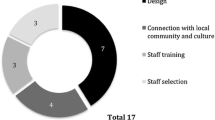Abstract
This essay is based on a June 2014 interview with Bernard Spolsky, in which he discussed his life with educational linguistics. A self-described “accidental professor,” Spolsky directed the first study of Navajo sociolinguistics, established educational linguistics as a field of study and practice, co-created a national language policy for Israel, conducted seminal language surveys of Māori and Samoan in support of Indigenous language revitalization efforts, and founded this journal. In the context of this work he has published 240 scholarly articles and book chapters and 35 books, including 66 “Recent Publications” written post-retirement. His recent work returns to his original interest in Jewish sociolinguistics. This article considers Spolsky’s remarkable legacy and his continuing contributions to the field of language planning and policy.



Similar content being viewed by others
Notes
Navajo Community College has been renamed Diné College.
Joel is now CEO of a major start-up Q & A company in New York; Ruth, with five children, is vice president for production of an Israeli start-up.
Language Policy has since been taken over by Springer Science.
Among the 36 doctoral students Bernard has directed, four are now professors emeritus or emerita, three others became full professors, and three are associate professors; a number of others teach English as a foreign language. One became an assistant secretary of education under President Nixon; another, after an academic career in a German university, became the authority on Black Forest horology in the U.S. Bernard’s former master’s students are widely scattered: Two are now professors emeriti in South Korea, and Bernard has edited two books with the daughter of one of them.
References
Hale, K. (2001). The Navajo language: II. In L. Hinton & K. Hale (Eds.), The green book of language revitalization in practice (pp. 199–201). San Diego, CA: Academic Press.
Holm, A., & Holm, W. (1990). Rock Point, a Navajo way to go to school: A valediction. Annals of the American Association of Political and Social Science, 508, 170–184.
Holm, A., & Holm, W. (1995). Navajo language education: Retrospect and prospects. Bilingual Research Journal, 19(1), 141–167.
Modiano, N. (1966). Reading comprehension in the national language: A comparative study of bilingual and all-Spanish approaches to reading instruction. (Unpublished Ph.D. dissertation). New York: New York University.
Modiano, N. (1968). National or mother language in beginning reading: A comparative study. Research in the Teaching of English, 2(1), 32–43.
Saville, N., & Kunnan, A. (2006). People and events in language testing: A sort of memoir. An interview with Bernard Spolsky. Language Assessment Quarterly, 3(3), 267–294.
Silentman, I. (1995). Navajo education in the 1970s: A personal perspective. Unpublished ms.
Spolsky, B. (1976). Linguistics in practice: The Navajo Reading Study. Theory into Practice, 24, 347–352.
Spolsky, B. (1978). Educational linguistics: An introduction. Rowley, MA: Newbury House.
Spolsky, B. (1994). Two Wellington families—Green and Spolsky. In S. Levine (Ed.), Standard for the people: The 150th anniversary of the Wellington Hebrew Congregation 1843–1993 (pp. 271–278). Christchurch, NZ: Hazard Press.
Spolsky, B. (2004). Language policy. Cambridge: Cambridge University Press.
Spolsky, B. (2010). Discovering educational linguistics: The Navajo Reading Study. Paper presented at the Italian Society of Linguists XLIV Congress.
Spolsky, B. (2014). The languages of the Jews: A sociolinguistic history. Cambridge: Cambridge University Press.
Spolsky, B., & Cooper, R. L. (1991). The languages of Jerusalem. Oxford: Clarendon Press.
Spolsky, B., Green, J. B., & Read, J. (1974). A model for the description, analysis, and perhaps evaluation of bilingual education. Navajo Reading Study Progress Report No. 23. Albuquerque: University of New Mexico.
Spolsky, B., & Holm, W. (1977). Bilingualism in the six-year-old child. In W. F. Mackey & T. Andersson (Eds.), Bilingualism in early childhood (pp. 167–173). Rowley, MA: Newbury House.
Spolsky, B., & Hult, F. M. (Eds.). (2008). The handbook of educational linguistics. Malden, MA: Blackwell.
Spolsky, B., Inbar-Lourie, O., & Tannenbaum, M. (Eds.). (2015). Challenges for language education and policy: Making space for people. New York, NY: Routledge.
Spolsky, B., & Shohamy, E. (1999). The languages of Israel: Policy, ideology and practice. Clevedon, UK: Multilingual Matters.
Young, R. W., & Morgan, W, Sr. (1987). The Navajo language: A grammar and colloquial dictionary (revised ed.). Albuquerque: University of New Mexico Press.
Author information
Authors and Affiliations
Corresponding author
Rights and permissions
About this article
Cite this article
McCarty, T.L. Questions for Bernard Spolsky. Lang Policy 15, 475–483 (2016). https://doi.org/10.1007/s10993-015-9381-z
Received:
Accepted:
Published:
Issue Date:
DOI: https://doi.org/10.1007/s10993-015-9381-z




